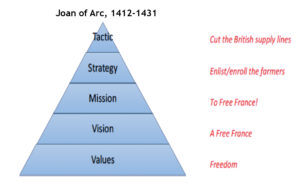Envisioning Family Legacy
While consulting with the head of a family business, I frequently raise the subject of “legacy.” It comes up in connection with strategies for helping family-businesses move along the path of intergenerational transition; toward multi-generational success. Often however, at the mention of this word, I’m met with a sort of attention disconnect. For my client, the challenges of managing the business day-to-day overshadow any thoughts of building a legacy. It seems that this short-term focus creates a sort of mental cloud that diffuses any comprehension of what legacy is. This cloud cover affords no vision of the importance of legacy, or of its function or its range. It’s as though contemplating a legacy for future generations demands too much energy right now, and is seen as a luxury.
What is it about the idea of a legacy that’s so daunting? According to the Merriam Webster online dictionary the noun “legacy” means:
1: a gift by will especially of money or other personal property: BEQUEST// She left us a legacy of a million dollars.
2: something transmitted by or received from an ancestor or predecessor or from the past[1]
This kind of disconnect is not unreasonable when legacy is perceived only according to these definitions. But in my experience legacy in family business is far less strictly defined. It’s much broader, and in many respects less tangible. It includes family history, values, stories and reputation. It reflects the family’s accomplishments and bears witness to its challenges. Legacy is the imprint left behind by previous generations for following generations to learn from and experience.
It’s said in family-business-advisory circles that legacy springs from seeds planted in a garden by earlier family members who, while they will never see the resulting fruit, provide for future generations. In that sense each family business’ legacy exists even before its birth.
It may be helpful then, for family-business leaders to understand that their task is not to create a legacy from scratch but rather to sustain the stories that inspire family members across generations, together with a shared set of attitudes, values, goals and behaviors that characterize their own particular family.
The result is a multi-generational culture of harmonious family relationships, shared wealth, ownership, meaning and purpose.
[1] https://www.merriam-webster.com/dictionary/legacy

